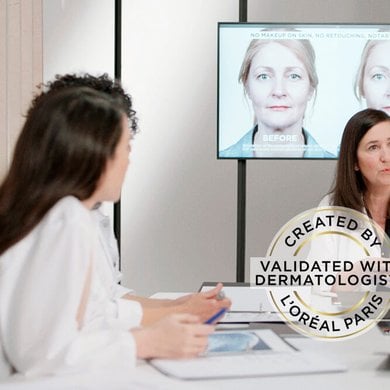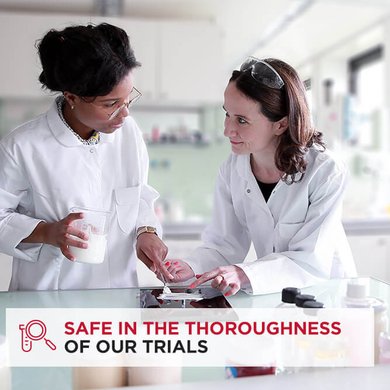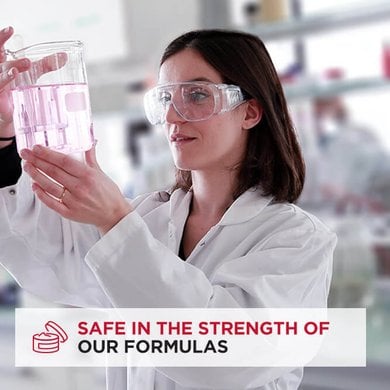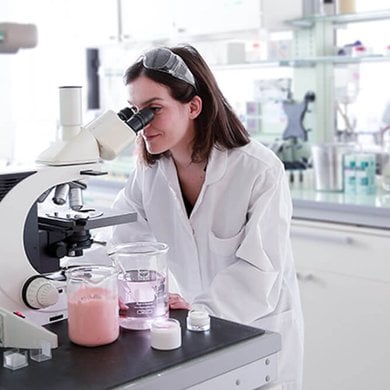

L'ORÉAL PARIS INTERNATIONAL BOARD OF DERMATOLOGISTS
They validate our most expert products through:
• Thorough review of test protocols and results
• Comprehensive ingredient screening for efficacy, safety and tolerance

To ensure our active ingredients are safe for all skin types, we apply our formulas on real skin 600 times (before it goes anywhere near yours).
Our commitment to safety does not stop there. We have also developed a remarkable platform of predictive strategies that allow us to identify new ingredients or new innovations to constantly enhance our products' safety as well as their performance. In addition to this, our practice of listening to our consumers or other stakeholders helps us to understand their concerns and to consider these also when deciding to reduce or to remove certain ingredients.

After we've tested the effectiveness of our products they're tested again independently (so we're doubly sure).
Our researchers relentlessly work to develop skincare products with better performance, integrating formulation technologies and actives with proven efficacy through clinical tests conducted by independent institutes.

L'Oréal Paris is committed to a world without animal testing. Over 30 years ago, we completely stopped testing our products on animals, years before it became the law.
We have developed a very rigorous safety evaluation procedure, and have developed ground-breaking testing alternatives like Episkin, which is created with human skin cells to mimic real skin. Certain health authorities may nevertheless decide to conduct animal tests themselves for certain cosmetic products, as is still the case in China. L'Oréal has been the most active company working alongside the Chinese authorities and scientists for over 10 years to have alternative testing methods recognised, and permit the cosmetic regulation to evolve towards a total and definite elimination of animal testing.
Find out more about Our Commitments
Discover the L'Oréal Paris commitments to safety, efficacy and a world without animal testing.
FAQs
Does L’Oréal test on animals?
L'Oréal does not test any of its products or any of its ingredients on animals and has been at the forefront of alternative methods for over 30 years.
What alternative methods to animal testing has L’Oréal developed?
For over 30 years, L'Oréal has been reconstructing human skin models in laboratories to elaborate safety tests in vitro that don’t involve animals. The group has thus been at the forefront of alternative methods for safety evaluation. Since then, L'Oréal has opened Episkin* in Lyon (France) and in Shanghai (China) where reconstructed skins are produced. Besides reconstructed skin models, L’Oréal has a large set of tools as part of its predictive evaluation that does not involve animals, such as molecular modeling, expert toxicology systems, imaging techniques, and many more.
If you don’t test products on animals, why is L’Oréal still on the PETA list of companies who test?
L’Oréal does not test any its products or any of its ingredients on animals. Nevertheless, because our products are sold in China, L’Oréal still figures on the PETA list. In China, the health authorities still require and carry out animal testing for certain products.
Why don’t L’Oréal products have the “cruelty-free” logo?
Some of our brands that are not present in China have decided to use a “cruelty-free” logo. The brands present in China cannot have a “cruelty-free” logo due to the cosmetics regulation in China.
So why are you still present in China?
By being present in China, L’Oréal can enable the regulation to evolve. L’Oréal is the most active company working with the Chinese authorities towards a total elimination of animal testing. As a result, the vast majority of products we sell in China are no longer tested on animals.
What actions are being implemented by L’Oréal to put an end to animal testing in China?
L’Oréal has been committed to working alongside the Chinese authorities for more than 10 years and scientists to have alternative testing methods recognized, and enable the cosmetics regulation to evolve towards a total and definite elimination of animal testing. Thus, today the products manufactured and sold in China called “non-functional” such as shampoo, body wash or make-up are already no longer tested on animals. We have opened an Episkin* Centre in Shanghai in 2014 enabling us to produce reconstructed skins. These skins are used for safety tests in vitro that do not involve animals and are made available for the Chinese authorities.
